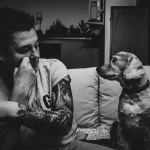Trust is a tender thing that rides on a sea of silent expectations, making it more fragile and prone to breakage than we may realise. Agreements – expressed and silent – that we think we have with others, are the building blocks of how we experience what we call love and the forces behind the language of trust. Betraying or breaking these promises calls into question the essence of our relationships. To trust, you need to understand each other, as well as know where you stand with the other person, you need to know where you are emotionally, mentally, financially, morally, spiritually and physically. One needs to feel safe in order to let go of the need to control each other and fall into a vulnerable space. And to trust is to feel safe enough to be vulnerable; if you cannot be vulnerable, it might be difficult to feel love.
In addition, we expect the people we trust to always really mean what they say and say what they really mean. Their actions and words should, in our minds, be a fair match. Therefore, saying something but not acting it out creates the experience of distrust. Adult relationships are conditional; this does not mean that they are based on rules and regulations – it means that, in any adult relationship, we have certain expectations, preferences and conditions that make us feel safe and loved. Not hurting you on purpose, being honest and giving your relationship priority over others are some of the most common conditions for most adult relationships. These preferences are “sacred” agreements as they protect and support the core experiences of any relationship: loyalty, trust, responsibility and respect. They are the actions of love.
Often, those personal agreements especially come to the fore on people’s wedding day or during a crisis. In other words, we think we have unconditional relationships until we hit a crisis in which one or both partners have broken the relationship’s agreements. Yet, the idea that “you will love me and accept me no matter what” is often not rational, because trust is made up of agreements and adult relationships are, in fact, conditional.
The irony is that, if you know what your relationship is built on and you stick to your agreements, you don’t need to focus on the conditions and agreements – it becomes second nature; it is only if a partner abuses this freedom and breaks the agreements that the relationship’s agreements and conditions suddenly become evident. The relationship starts to feel more like a relationship of transactions and agreements than of love and acceptance.
First wound: our first and primary break in trust often happens in our relationships with one or both our parents. Like any child in a relationship with their parents, we seem to have expectations of them that can last until the day they die. We may be adults having an adult relationship with our parents, but we trust that our parents will mother us or father us, choose our sides, protect us and love us, unconditionally.
You parents “failing you” often inflicts your first big emotional wound. We carry this wound into our adult relationships, playing it out in our friendships and intimate relationships. The most common emotional wounds are about being rejected, unloved, abandoned, ignored, neglected or not chosen – they’re all about never feeling good enough or loved enough or seen enough.
But maybe our expectations of parenting are simply not in line with our parents’ expectations. Expectations are silent needs; in other words, an expectation is an unexpressed need. So, consider speaking up about what you need, rather than being weighed down by so many silent desires that hurt you.
It seems obvious that if you do not speak openly and honestly about what you expect in any relationship, you’ll continue to hurt yourself with your own expectations. Never build a relationship with your parents – or children – on silence; build it on truth. After all, it is these relationships that form our grounding practice for speaking about our needs and desires in any other connection.
And the truth is that you can never build any relationship on fantasy, only on what you really, honestly have – right now.
Second wound: Friendships and intimate relationships often represent our next encounter with betrayal. We enter these relationships with expectations of love and acceptance and yet it seems that these experiences can hurt and shape us forever.
Here the injuries are often about not being chosen. The primary experience is about rejection. The need to be liked and accepted by others becomes so important that we sacrifice our desires with a single intention, to please others. To avoid the familiar pain of rejection, we sometimes sacrifice who we deeply are.
As a therapist, I often hear everyday betrayals that can make us question everything in our relationships: We assume that we’re on the same page; we expect that we, and our life partners and friends, will take care of one another by sticking to these everyday agreements; we expect to be treated with kindness and respect. And we regard these agreements and how we honour them, as signs of love and respect.
The irony is that to recover, one will often need to use a way of speaking that didn’t work before the break in trust, explore new ways of communicating with each other. Whether in or outside therapy, this means remembering that your recovery process is always about two people’s contributions to a new direction – even if only one partner broke the trust. This is obviously difficult to accept: that healing from the betrayal will require a change from both of you.
Betrayal is your moment of truth. When agreements are broken, it’s easy to feel that you no longer see the promises you’ve made to each other in the same way. But this is an opportunity to step into the truth, to see your partner, mother, father or friend for who they are. As upsetting as this can be, it’s also a moment of honesty in which people can speak about what they really think the relationship is made of… And learn how to trust again. ML
Stefan Blom is a clinical psychologist who specialises in relationships. He lives and works in Cape Town and is the author of The Truth About Relationships (translated into Afrikaans and Romanian).
http://blom.studio/relationships
https://www.instagram.com/blom.studio


















 Become an Insider
Become an Insider